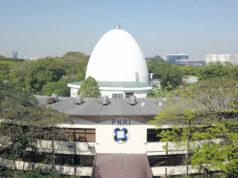THE renewables industry said its potential for providing energy is “untapped” while its safety record is superior to that of nuclear energy, which the government is considering adding to the power generation mix.
“If we need more power, the renewable energy potential of our country is already at 250 gigawatts, and that excludes solar energy. It is an untapped resource (that) is safe, reliable, and perfect for scaling from small communities to big cities,” Gerard C. Arances, the convenor of the Power for People Coalition, said in an e-mail.
Malacañang said Wednesday that Executive Order (EO) No.116 authorized a study on the feasibility of nuclear energy and called for the development of a national policy on nuclear energy.
The order indicates that a nuclear energy program is at hand which will aid in achieving energy security and shield consumers from price volatility, Energy Secretary Alfonso G. Cusi said.
The inclusion of nuclear energy in the generation mix “may add problems,” according to Bayan Muna Partylist.
“The government should instead concentrate on renewable energy rather than dangerous sources of power like the long-mothballed Bataan Nuclear Power Plant,” Representative Carlo Isagani T. Zarate said in a statement.
The EO, which President Rodrigo R. Duterte signed on July 24, constitutes the Nuclear Energy Program Inter-Agency Committee, which will be conducting the review on nuclear adoption. The committee will be led by the Department of Energy (DoE) and the Department of Science and Technology (DoST).
It will evaluate the viability of the 620-megawatt BNPP.
Mr. Zarate said the “dangers and disadvantages far outweigh the presumptive benefit” of the potential reopening of the nuclear facility.
According to the DoE, nuclear generation will be beneficial if the Philippines manages to address infrastructure gaps and meet other requirements set by the International Atomic Energy Agency (IAEA).
“(N)uclear energy is one of the cheapest sources of electricity and the cleanest, with near-zero emissions,” said Dr. Carlo A. Arcilla, director of the DoST’s Philippine Nuclear Research Institute.
However, Mr. Zarate disputed the claim that nuclear power is cheap and a low-carbon source.
“(W)hen all the energy-intensive stages of the nuclear fuel chain are considered — from uranium mining to nuclear decommissioning — nuclear power is not a low-carbon electricity source. Nor is it cheap,” he said.
Senator Sherwin T. Gatchalian said in a statement said the study must be done with “utmost transparency” and that the public should be “well-informed on the inherent risks and potential of nuclear power.”
The government will work closely with the IAEA and other experts in introducing nuclear power into the generation mix, Mr. Cusi said. — Adam J. Ang



